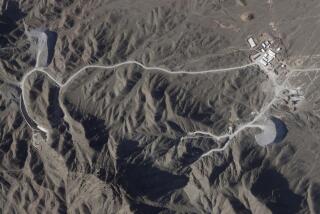Iraqi Bomb Is Years Away, British Say
- Share via
WASHINGTON — Iraq will not be able to produce a nuclear weapon as long as U.N. sanctions remain effective, and Baghdad is at least five years away from building a workable nuclear device even if sanctions were removed, according to a dossier released Tuesday by the British government.
The report, based on assessments from Britain’s intelligence agencies, provides the most detailed public accounting yet available of what Iraqi President Saddam Hussein has done to develop nuclear and other weapons of mass destruction since inspectors from the United Nations and the International Atomic Energy Agency were forced to leave Iraq in 1998.
Overall, the dossier compiled by Prime Minister Tony Blair’s government backs Bush administration claims that Iraq is actively pursuing a covert effort to develop nuclear weapons. It discloses for the first time, for example, that Baghdad has tried to import “significant quantities of uranium” from Africa since 1998, even though Iraq has no nuclear power plants and thus “no legitimate reason to acquire uranium.”
U.S. and British officials declined to identify the source of the uranium, but outside experts said authorities have intercepted uranium smuggled from Gabon and Niger.
In addition, the British report discloses that since 1998, Iraq has repeatedly sought to import specialized machinery, materials and technology that could be used to construct and operate small gas centrifuge cascades to produce weapons-grade enriched uranium.
The report notes, for example, that Iraq has made “repeated attempts” to covertly acquire “60,000 or more” specialized aluminum tubes that are subject to international export controls because they can be used to construct gas centrifuges.
In a document released in conjunction with President Bush’s Sept. 12 address to the United Nations, the White House said U.S. officials believe the tubes “were intended as components of centrifuges to enrich uranium” and thus were proof of Baghdad’s nuclear weapons program.
The British report notes, however, that “there is no definitive intelligence that [the tubes are] destined for a nuclear program.” Other experts say the tubes also can be used for conventional artillery in multiple-rocket launch systems.
The British report similarly identifies for the first time a series of attempts by Baghdad to import “dual use” materials and technologies that could be employed for benign industrial purposes or for nuclear weapons development.
Among them:
* Iraq has sought to import vacuum pumps that could be used to create and maintain pressures in a gas centrifuge cascade.
* It has tried to buy “an entire magnet production line” of the correct specification for use in motors and top bearings of gas centrifuges.
* It has imported significant amounts of anhydrous hydrogen fluoride, a gas commonly used in the petrochemical industry but also needed to convert uranium into uranium hexafluoride for use in gas centrifuge cascades.
* It has tried to buy a large filament winding machine that could be used to manufacture carbon-fiber gas centrifuge rotors. It also has sought to buy a machine that could be used to help balance a centrifuge while it is operating.
U.S. officials said the British report is consistent with U.S. intelligence. “We wouldn’t quibble with it,” one official said.
But David Albright, a physicist who worked with the inspections program in Iraq from 1992 to 1997, said the report was surprising because the British view the Iraqi nuclear threat as less immediate.
“There’s a big disagreement with the U.S. over how effective sanctions are and how close the Iraqis are” to building a bomb, said Albright, now president of the Institute for Science and International Security, a Washington think tank. “The British are saying the threat is not imminent at all.”
Most significant, British intelligence concluded early this year that Iraq “would not be able to produce a nuclear weapon” while current U.N. sanctions remain effective, according to the report. Iraq would need “at least five years” to build a bomb if sanctions were dropped, it adds.
Even if it was able to buy highly enriched uranium or other fissile material for bomb fuel on the international black market, Iraq would still need one to two years, the report says. No evidence indicates that Baghdad has obtained such material from foreign sources, U.S. officials say.
In contrast, the Sept. 12 White House paper says Hussein could build a nuclear bomb “within months” if he obtained fissile material from abroad. In August, Vice President Dick Cheney warned that Hussein could acquire a nuclear weapon “fairly soon.”
An unpublished U.S. intelligence report is more in line with the British estimate. It asserts that Iraq could build a nuclear weapon “by the end of this decade” if sanctions are dropped. “If they can buy fissile material [from foreign sources], that would drastically shorten the time,” said an intelligence official.
An Iraqi crash program to build a bomb was perhaps a year away from success when it was interrupted in 1991 by the Persian Gulf War.
After the war ended, inspectors from the United Nations and the International Atomic Energy Agency uncovered and dismantled a secret network of about 40 nuclear facilities across Iraq, including sites used for uranium separation and enrichment and for weapons development and production.
And in mid-2001, the British dossier notes, Britain’s intelligence services concluded that after the U.N. inspectors left Iraq, Baghdad secretly resumed its nuclear weapons research.
More to Read
Sign up for Essential California
The most important California stories and recommendations in your inbox every morning.
You may occasionally receive promotional content from the Los Angeles Times.











